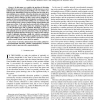Free Online Productivity Tools
i2Speak
i2Symbol
i2OCR
iTex2Img
iWeb2Print
iWeb2Shot
i2Type
iPdf2Split
iPdf2Merge
i2Bopomofo
i2Arabic
i2Style
i2Image
i2PDF
iLatex2Rtf
Sci2ools
129
click to vote
JSAC
2006
2006
Optimal Bandwidth Allocation in a Delay Channel
In this paper, we consider the problem of allocating bandwidth to two queues with arbitrary arrival processes, so as to minimize the total expected packet holding cost over a finite or infinite horizon. Bandwidth is in the form of time slots in a time-division multiple-access schedule. Allocation decisions are made based on one-step delayed queue backlog information. In addition, the allocation is done in batches, in that a queue can be assigned any number of slots not exceeding the total number in a batch. We show for a two queue system that if the holding cost as a function of the packet backlog in the system is nondecreasing, supermodular, and superconvex, then: 1) the value function at each slot will also satisfy these properties; 2) the optimal policy for assigning a single slot is of the threshold type; and 3) optimally allocating slots at a time can be achieved by repeatedly using a policy that assigns each slot optimally given the previous allocations. Thus, the problem of find...
Related Content
| Added | 13 Dec 2010 |
| Updated | 13 Dec 2010 |
| Type | Journal |
| Year | 2006 |
| Where | JSAC |
| Authors | Navid Ehsan, Mingyan Liu |
Comments (0)

